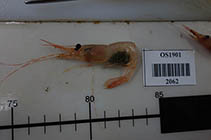Pandalus goniurus Stimpson, 1860
Humpy shrimp| Native range | All suitable habitat | Point map | Year 2050 |

|
| This map was computer-generated and has not yet been reviewed. |
| Pandalus goniurus AquaMaps Data sources: GBIF OBIS |
Classification / Names Κοινά ονόματα | Συνώνυμα | CoL | ITIS | WoRMS
Malacostraca | Decapoda | Pandalidae
Environment: milieu / climate zone / εύρος βάθους / distribution range Οικολογία
; εύρος βάθους 5 - 909 m (Αναφ. 82652), usually 5 - 450 m (Αναφ. 91801). Boreal, preferred 4°C (Αναφ. 107945); 73°N - 42°N, 130°E - 122°W
Distribution Χώρες | Περιοχές FAO | Οικοσυστήματα | Παρουσίες | Εισαγωγές
North Pacific and Arctic: From the Arctic coast of Alaska, to Chukchi and Bering Sea southward to Okhotsk Sea, the Sea of Japan and Puget Sound. Temperate to polar.
Length at first maturity / Μέγεθος / Weight / Age
Γεννητική Ωρίμανση: Lm ? range ? - ? cm Max length : 14.2 cm TL αρσενικό/απροσδιόριστο; (Αναφ. 8)
Life cycle and mating behavior Γεννητική Ωρίμανση | Αναπαραγωγή | Γεννοβολία | Eggs | Γονιμότητα | Larvae
Main reference
Αναφορές | Συντονιστής | Συνεργάτες
Williams, A.B., L.G. Abele, D.L. Felder, H.H. Hobbs Jr., R.B. Manning, P.A. McLaughlin and I. Pérez Farfante 1988 Common and scientific names of aquatic invertebrates from the United States and Canada: decapod crustaceans. American Fisheries Society Special Publication 17. 77 pp. + 12 figs. (Αναφ. 2214)
IUCN Red List Status
(Αναφ. 130435: Version 2025-1)
CITES status (Αναφ. 108899)
CMS (Αναφ. 116361)
Threat to humans
Human uses
αλιεία: Εμπορικό(ά)
FAO - αλιεία: landings | FishSource | Η θάλασσα γύρω μας
Εργαλεία
Περισσότερες πληροφορίες
Max. ages / sizes
Length-weight rel.
Length-length rel.
Length-frequencies
Mass conversion
Αφθονία
Διαδικτυακές πηγές
BHL | BOLD Systems | CISTI | DiscoverLife | FAO(αλιεία: ; publication : search) | Fishipedia | GenBank (genome, nucleotide) | GloBI | Gomexsi | Google Books | Google Scholar | Google | PubMed | Δέντρο Ζωής | Wikipedia (Go, αναζήτηση) | Zoological Record



